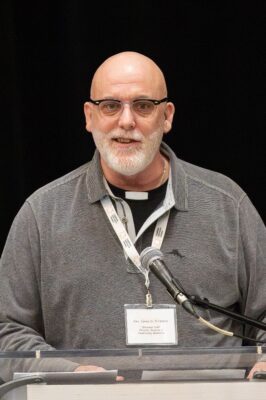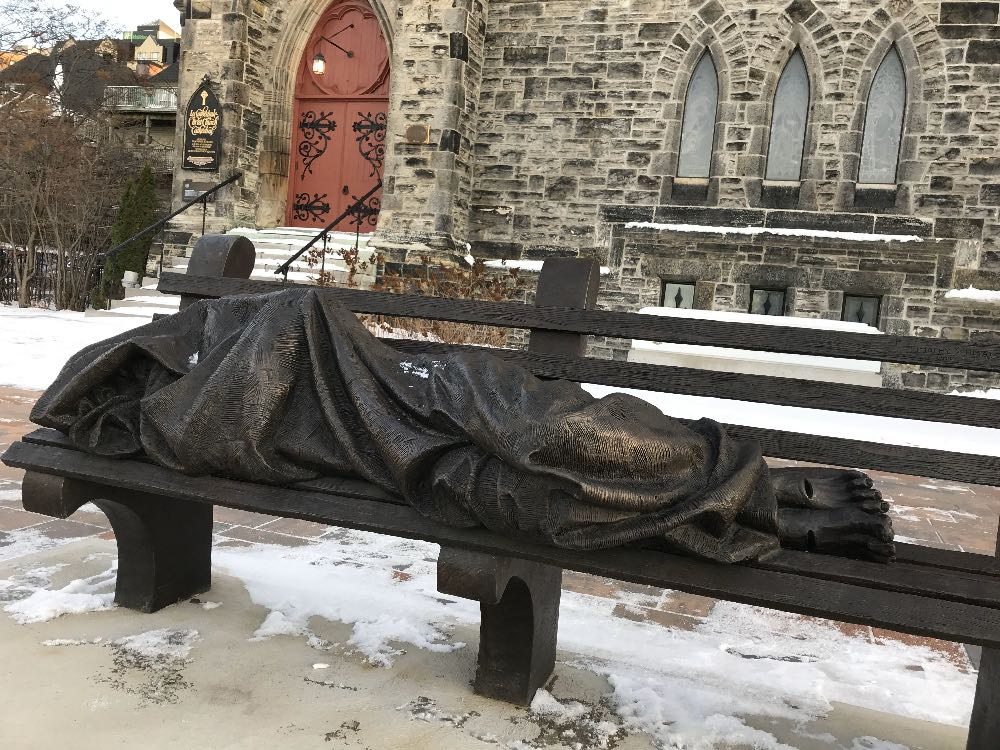As director general of the Anglican Community Ministries, Canon Hobbs spoke to Synod in October and offered this view of the dire situation many vulnerable people face this winter and how Christians can respond.
Every so often I like to go on a walk throughout downtown Ottawa. I leave my office at Ascension House, passing the Refugee Ministry Office on the way out the door, and I hit the streets. I take a rather circuitous route, so I can pass various sites of our Anglican Community Ministries—Belong Ottawa at Centre 454, The Well, and St Luke’s Table; Cornerstone Housing for Women at their shelter, at their supportive housing locations on MacLaren, at MacPhail House, and Booth Street, and The Ottawa Pastoral Counselling Centre at the Bronson Centre. It is striking over the past few years that almost every block on the way has evidence of homelessness and poverty. People hanging out on the streets, sleeping, openly using drugs, and many encampments. Two years ago, it was like nothing like I had ever seen – I could not imagine it getting worse. Sadly, today it is.

Photo: The Ven. Chris Dunn
This of course is not only a downtown Ottawa issue by any means. In the city of Cornwall, there are at least three large encampments including a conservative estimate of 120 people sleeping in tents and under tarps. A number of our parishes in villages, towns, suburbs can bear witness to folks setting up camp on church properties. For example, at St. James Morrisburg this summer, a few people camped on church property, others lived out of their cars, still others are sheltered in local motels, paid for by the municipal government at a cost of $5000 a month.
Underpasses, parks, walkways, doorways, increasingly more and more people have fallen into desperate situations and find themselves without homes, without permanent, safe, affordable housing.
Martine Dore, director of program and services at Cornerstone, says, “This is the most challenging time Cornerstone has ever experienced.” Martine wrote the following note to me in October: “We have heard of the secondary pandemics, following COVID 19, of mental health and substance use impacting the general population, of the increased depression, isolation, anxiety and a decrease in a self of connectedness and wellbeing. These subsequent effects of a health pandemic have hit the most vulnerable population even more profoundly. Those who already struggled with mental unwellness, poverty, and addiction have been pushed even more to the fringes of society.”
This summer people arrived in Canada as asylum seekers and found themselves without resources or places to stay. In Ottawa, the number of newcomers seeking shelter has increased by 165 percent. Still, the first inhabitants of this land, Indigenous Canadians, are disproportionately represented amongst the people on the street and in shelter.
For the first time, there is not enough shelter space to accommodate everyone looking for a bed or a mat to lay their head. Municipalities struggle to manage the influx of vulnerable people, shelters, and social service agencies, including our own Community Ministries, are overwhelmed.
The incidence of drug overdoses is on an exponential rise as toxic, deadly drugs are hitting the streets. People are dying. We are struggling to keep people alive for just another day. In Vanier, people sleep on the ground of St Margaret’s each night. The Rev. Colin McFarland checks in the morning to ensure that are alive. Sadly, with such nasty and toxic drugs comes very difficult behaviour. Neighbors are nervous, often frightened and upset. It’s understandable—though some make it clear that services provided by agencies such as our Community Ministries should move or just close down, thinking that will solve the immediate problem. It won’t. It will make this worse.
Cornerstone has a policy with procedures to follow in the event of a serious occurrence—a situation involving such things as an assault on staff or other residents, an overdose, the death of a resident or a fire. In the six years prior to this one, beginning in 2017, Cornerstone reported a combined total of 11 serious occurrences, that’s about two a year. So far in 2023, there have been 12. Our staff at Belong Ottawa Centre 454 administer naloxone on a near daily basis to people who have overdosed, saving lives. Parishioners at St Albans on the same site as Centre 454, have administered naloxone to people outside the church door on Sunday mornings. Our small but remarkable staff at Centre 105 in Cornwall, with many volunteers, served 6,000 meals in 2019. This year, it will be over 22,000. Our staff are on the frontline of a challenging, traumatic and dispiriting crisis.
“…We are called to the greater community,
to collaboration and partnership,
confident the Spirit moves in our midst.”
I regret that I describe a situation that seems to have no end. As Mike, a participant of Centre 105 has said, “The past five years have only gotten harder. I can only imagine what it will look like in the next five years.”
The opioid crisis, the homelessness crisis, the number of souls living precariously on the streets or in shelters, or in horrible rooming houses is not by any means abating. Neighbours are frustrated, staff are stressed, organizations are stretched to capacity, leaders are seemingly confounded at the extent of the problem, and thousands of people are living desperate, risk-laden lives.
You might ask “What is being done?”
I can speak to what we are doing in our Community Ministries and in some areas of our diocese. First and foremost, we continue to serve those who are most vulnerable in our midst who often struggle with many issues at one time—poverty, homelessness, addiction, mental illness, and life altering trauma.
We take seriously the well-being of our staff. We seek to provide them with support and opportunities for professional development. We invite feedback and seek to create teams of mutual support. The Ottawa Pastoral Counselling Centre provides counselling to any staff who seek it and is working to support Belong Ottawa in staff support groups and critical incident debriefing.
Collaboration—always critical in this work—is all the more so at this time. Centre 105 partners with a Recovery Care Mobile Clinic, which visits each week with a nurse and addiction counsellor, and also partners with the Eastern Ontario Health Unit with a focus on harm reduction.
In talking to the Rev. Nick Forte of the Parish of the Valley, I learned that in the city of Pembroke where visible homelessness in on the rise, our Lutheran partners are hoping to open their church as a warming centre this winter. We Anglicans, Nick says, are looking to support this initiative.
In Ottawa, in areas of high density where street involvement is highly intensified, we are members of Community Liaison Committees. In the Sandy Hill neighborhood, where Belong Ottawa at Centre 454 and the parish of St Albans are located, Rachel Robinson, executive director of Belong Ottawa, and the Rev. Michael Garner, incumbent of St Albans, are working with other agencies, city staff, and neighbors. This is replicated in Somerset West where Belong Ottawa at St Luke’s Table and Cornerstone are at the table with neighbours, partner agencies and city representatives. In Centretown, St. John the Evangelist with the Rev. Canon Gary van der Meer and Belong will collaborate in engaging local merchants.
Our Diocese is building affordable housing. For example, Ellwood House on the campus of St Thomas the Apostle in Alta Vista, Hollyer House at Christ Church Bells Corners, and Cornerstone are engaged in the construction of new affordable housing, which will result in 115 homes for those experiencing or at risk of homelessness. In Smiths Falls, St John’s is a major contributor to an affordable housing project.
And there is advocacy, articulating to elected officials the need for systemic change, additional resources and political will. Our Community Ministries (and through them, our Diocese) are active members of the Alliance to End Homelessness. What we learn through our work with the alliance and similar coalitions is that there are ample solutions to address homelessness and poverty—solutions that are rooted in compassion, analysis, and that make good economic sense.
Homelessness is a failure of public policy, and we need to advocate this in no uncertain terms.
And as we advocate for major systemic change, which will take time, we are in conversations now with municipal officials regarding the looming winter season with its increased threat to people’s lives.
You may ask, ‘What can I do? What can we do?’ The answer to this question depends on so many things: where you live, where your parish church is located, what’s happening in your neighborhood. Staff and volunteers of our Community Ministries would say, learn as much as you can about the problem: identify the groups and individuals, agencies, other churches and faith groups engaged in this issue. Go for a walk and observe. If you are a person who likes data, there is lots of it out there. If you are drawn to direct service, volunteer. Continue to be generous, gifts are received with gratitude and provide relief. Talk to elected officials and candidates during elections. So many of us are already doing all of the above and so much more. For parishes, this crisis squarely falls within the framework of contextual mission.
In the broadest and most profound sense, the answer to the question of ‘What can we do?” is be ambassadors. St Paul wrote to the small church in Corinth: “We are ambassadors for Christ, since God is making his appeal through us.” Those words roll down through the ages. We are ambassadors for Christ, God is making God appeal through us. And as we know in this day, not only through us—the Spirit is at work in so many places—in our communities and neighborhoods, in our partner agencies, in the many faith groups with whom we walk, in the voices of those who suffer, the Spirit is present. So, we are called to the greater community, to collaboration and partnership, confident the Spirit moves in our midst.
In the gospel on Thursday evening, from Luke’s gospel, Jesus —once a refugee, often homeless, reliant on others, often in trouble with the authorities—returned home to Nazareth and in the synagogue read from the prophet Isaiah: ‘The Spirit of the Lord is upon me, anointed me to bring good news to the poor, proclaim release to the captives, recovery of sight to the blind, to let the oppressed go free.” Soon after he spoke these words Jesus would be rejected by his neighbours.
Scripture contains passage after passage that attests God’s care for those who suffer, for those most vulnerable, on the margins, unwell, living in poverty. God’s love is for all and is found in all. As ambassadors for Christ, let that be our message.
The situation I describe today can be overwhelming—it can be hard to be optimistic. Yet, as disciples of Jesus, ambassadors for Christ we are bound by hope. So, what can we do, let us together, live into the fulfillment of our hope.


Week of Prayer for Christian Unity annual service to be celebrated at Saint Paul University on Jan. 22